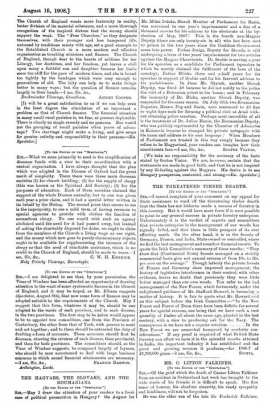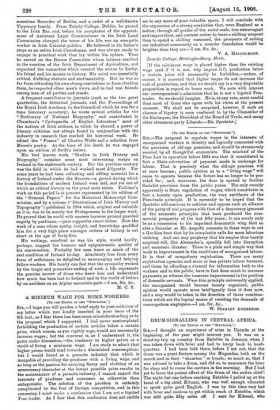MR. C. LITTON FALKINER.
[To THE EDITOR OF THE "SPECTATOR'] SIR,—Of the grief which the death of Caesar Litton Fallriner from an accident in Switzerland last week has brought to the wide circle of his friends it is difficult to speak. His fine sense of honour, his absolute sincerity, his ready sympathy and kindliness, will not be forgotten.
He was the elder son of the late Sir Frederick Falkiner, sometime Recorder of Dublin, and a cadet of a well-known Tipperary family. From Trinity College, Dublin, he passed to the Irish Bar, and, before his acceptance of the appoint- ment of Assistant Legal Commissioner in the Irish Land Commission changed the tenor of his life, was an energetic worker in Irish Unionist politics. He followed in his father's steps as an active Irish Churchman, and was always ready to engage in practical work that lay within his sphere. Thus he served on the Recess Committee whose labours resulted in the creation of the Irish Department of Agriculture, and organised the committee which erected the statue to Lecky, his friend and his master in history. His mind was essentially critical, disliking rhetoric and sentimentality. But he was as far from obtruding his own strong convictions as from cloaking them, he respected other men's views, and be had real friends among men of all parties and creeds.
A frequent contributor to journals (such as the two great quarterlies, the historical journals, and the Proceedings of the Royal Irish Academy, to the Council of which he was for a time honorary secretary), he wrote several articles for the "Dictionary of National Biography," and contributed to Chambers's " Cyclopaedia of English Literature" most of the notices of Irish authors, in which he showed a power of literary criticism not always found in conjunction with the industry in research that marked his historical work. He edited the "Poems" of Charles Wolfe and a selection from Moore's poetry. At the time of his death he was engaged upon an edition of Swift's letters.
His best known work, "Studies in Irish History and Biography," contains some most interesting essays on Ireland in the eighteenth century. But the previous century was the field in which he had worked most diligently. For some years he had been collecting and sifting material for a history of Ireland under the Stuarts,—a period during which the foundations of modern Ireland were laid, and yet one of which no critical history on the great scale exists. Falkiner's work on this period is at present represented by his edition of the "Ormond Papers" for the Historical Manuscript Com- mission, and by a volume (" Illustrations of Irish History and Topography") published in 1904 which, original and valuable as it is, was to be merely the Prolegomena to the larger work. He proved that he could with success traverse ground guarded eagerly by partisans,—ignes suppositos cineri doloso. Now the work of a man whose sanity, insight, and knowledge qualified him for a very high place amongst writers of history is cut short at the age of forty-five.
His writings, excellent as was his style, would hardly, perhaps, suggest the humour and epigrammatic quality of his conversation. Probably few men knew so much of the real condition of Ireland to-day. Absolutely free from every form of selfishness, he delighted in encouraging and helping fellow-workers. His family can feel that the sympathy evoked by the tragic and premature ending of such a life represents the genuine sorrow of those who knew him and understand how much has been lost to Ireland and to the world of letters by an accident on an Alpine mountain-path.—I am, Sir, &c., M. C. S.







































 Previous page
Previous page